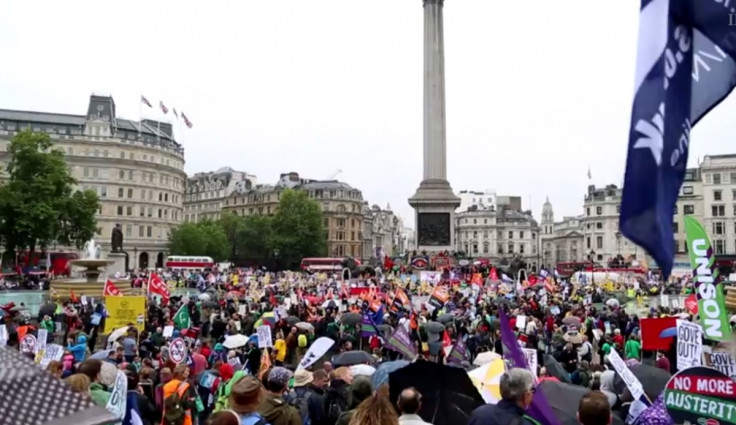UK Public Sector Strike: Thousands Descend on Trafalgar Square for Pay Protest

Thousands of public sector workers have descended on Trafalgar Square in a protest over pay, pensions and living standards.
The action was part of a national one-day walk out by union members, including firefighters, teachers and civil servants.
The move follows a public sector pay freeze in 2010, and the Coalition Government's introduction of a 1% pay cap in 2012 – below the most recent Consumer Price Index inflation rate of 1.5%.
"The majority of people find it unacceptable what's happening to this country at the moment," Jacqui Howard, an organiser with the campaign group The People's Assembly, told IBTimes UK.
"People are being driven into poverty, inequality is increasing on a massive scale, pay rises are happening for people at the top - for politicians, for managers - while those on the ground are facing real wage decline."
Neil, a firefighter based in London who preferred not to be fully named, added: "Most of us who have contributed to pensions for over 20 years are feeling very embittered that the agreement we went into when we signed up 20 years ago is not being kept by the government.
"My pension [contributions] have gone up 14.4% of my salary for a pension that I may not receive and that I'm going to have to work longer to get."
But David Cameron condemned the strike at Prime Minister's Questions on July 9 and pledged to introduce new strike laws, including a minimum turnout threshold on strike ballots, if the Conservative Party is voted into Number 10 at the 2015 General Election.
"I don't think these strikes are right," Cameron told MPs. "I think people should turn up for work.
"I think the time has come for looking at setting thresholds in strike ballots."
"How can it possibly be right for our children's education to be disrupted by trade unions acting in that way? It is time to legislate and it will be in the Conservative manifesto."
The Cabinet Office said it believed most people would come to work as usual, but stressed that rigorous contingency plans were in place to "minimise the impact of action" and ensure that key public services remained open.
© Copyright IBTimes 2025. All rights reserved.






















